Growing old alone: Elderly poor want better housing, better care in Taiwan
Taiwan is set to become a super-aged society in 2025. At present, a considerable proportion of its elderly face poor living conditions, with 430,000 living in old residential buildings without elevator access. There is also a sizeable number of elderly folk who are homeless and living on the streets. What are the authorities doing to meet the living needs of the elderly and provide them with support? How are community groups playing a role?
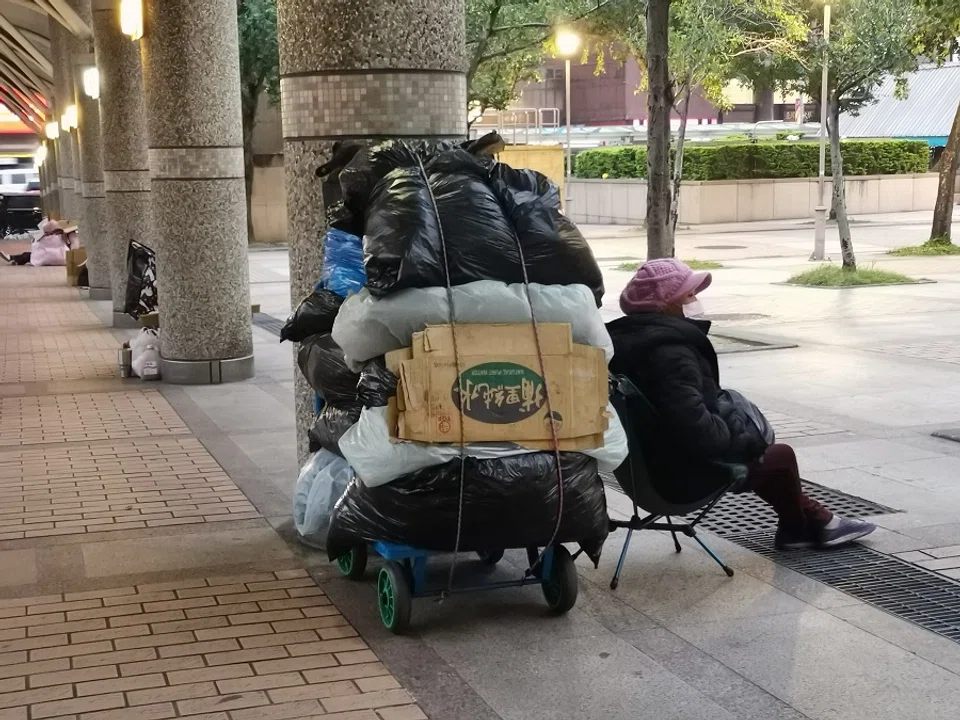
(Photos: Woon Wei Jong, unless otherwise stated)
70-year-old Luo Yuelan lives alone. Carrying a bucket of ingredients for making rice cakes, she struggles to walk the five levels up to her unit in a housing block without elevator access.
70-year-old Lao Lin who is homeless (referred to as 街友 jieyou, lit. "friends of the streets" in Taiwan) was shivering from the cold on a winter's night, and struggling to fall asleep at the Taipei Main Station. The other homeless people around him were already asleep; he was the only one awake and had a vacant look on his face.
According to the United Nations, an ageing society is one in which 7% of the entire population is made up of those who are 65 years old and above. For an aged society and a super-aged society, the criterion is 14% and 21% of the entire population respectively.
As of January 2021, 16.2% (more than 3.8 million people) of Taiwan's population are aged 65 years and above. By 2025, this group will make up more than 21% of Taiwan's population, making it a super-aged society. In 2007, Japan became the first super-aged society in the world, while it is predicted that Singapore will join its ranks in 2030.
Elderly living in old flats with poor lift access
When I took a closer look at the living conditions of the elderly in Taiwan, I found two situations of grave concern - elderly folks "trapped" in their old homes and the homeless elderly.
According to the Ministry of Interior, of the 8.91 million households in Taiwan, as many as 4.49 million or 50.4% live in houses that are at least 30 years old. Amongst them are 430,000 elderly people living in old houses without elevator access, which makes it difficult for them to leave their homes.
In Taipei, the proportion is even higher. As of the middle of 2021, 44.2% of all residences there are more than 40 years old.
When I visited the South Airport Resettled Tenement (南机场整宅) built 54 years ago in 1968 at the Zhongzheng district in Taipei, I ran into Luo Yuelan who was about to climb the stairs with her bucket. Such resettled tenements (整建住宅) are low-cost public housing projects built in the 1960s and 70s to house resettled households, those with low incomes and retired military personnel.
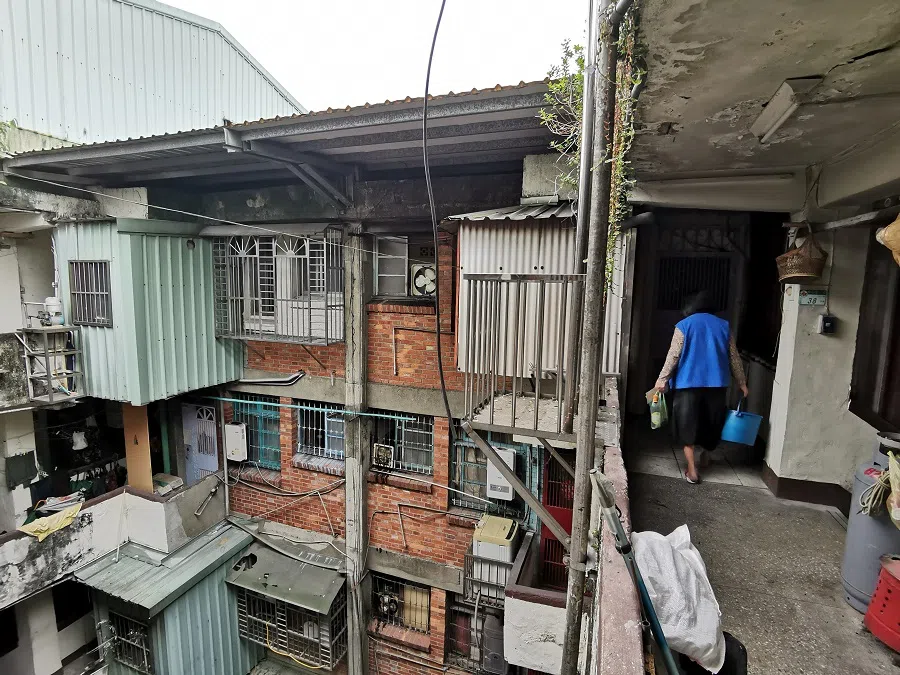
After I helped Luo up to her home on the fifth floor, she shared that she has been living alone in the small apartment of 8 ping (around 26 sqm) on a monthly rental of NT$7000 (around S$342) since her husband and only son passed away. With a monthly pension of NT$12,000 (around S$587) and a low-income household subsidy of some NT$7,000 (around S$342), Luo said self-mockingly that while she was not starving, she could not afford to eat her fill as well.
As for government plans to refurbish the old housing development (under the urban regeneration programme in Taiwan), Luo has long given up hope. She said, "After more than ten years of talks, no agreement has been reached. The poor households are unable to foot the down payment, while the night market vendors downstairs are reluctant to move since business is good."
According to social workers, those in this group often pass away alone at home due to sickness, and their deaths undetected until their corpses begin to decay and smell.
According to the Ministry of Health and Welfare, at the end of the second quarter of 2021, 42,305 old people were registered as living on their own and needing aid. Based on figures from the Ministry of Interior, the number of households of elderly folks living alone has risen from 226,000 a decade ago to the present 477,000.
Many elderly folks who have difficulties getting about and live alone are "trapped" in their old houses since it is a challenge for them to use the stairs. According to social workers, those in this group often pass away alone at home due to sickness, and their deaths lie undetected until their corpses begin to decay and smell.
Sleeping rough out in the cold
While the prospects do not look good for elderly folks who own or rent their houses, they are even bleaker for those who are both jobless and homeless, a group that is receiving more attention due to the pandemic.
It was 11pm on a cold winter night and the temperature outside was only 15 degrees Celsius. 70-year-old Lao Lin was sitting on some cardboard at a corner near the entrance to the Taipei Main Station. Using an open umbrella, he tried to ward off the bursts of cold wind.
While the other homeless people around him were already asleep, Lin was kept awake by cold and hunger. During the interview, he was courteous and friendly even though he was shivering as he spoke.
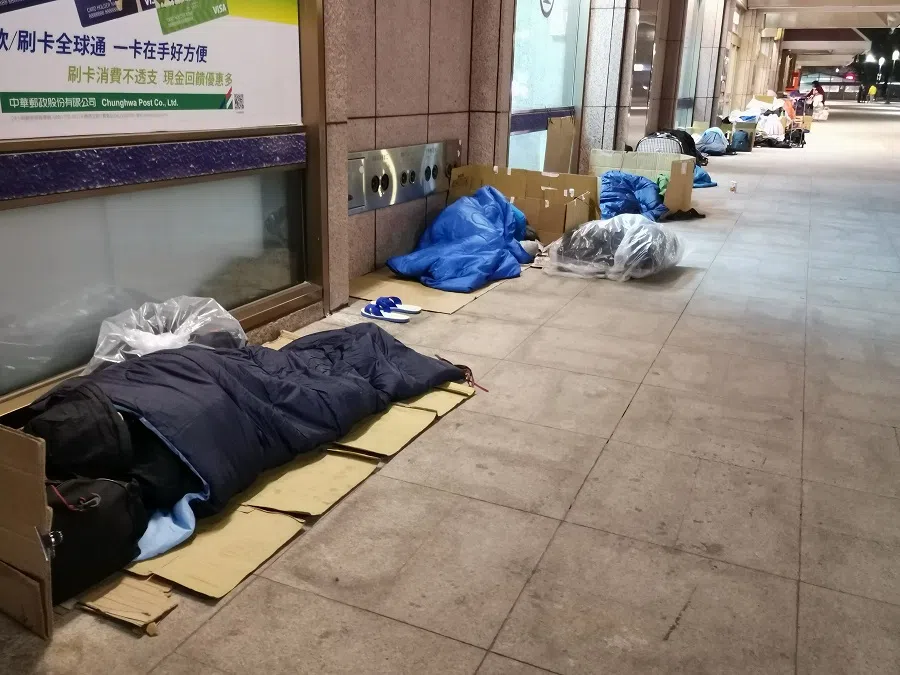
Lin used to work in sales. About half a year ago, the company he worked for closed down as a result of the economic downturn caused by the pandemic. Since he could not afford the rent of NT$8,000 (around S$400), he had to sleep rough at the Taipei Main Station, relying on food distributed by enthusiastic volunteers for sustenance.
Lin, who is single, said that his parents passed away a long time ago and he did not stay in touch with his siblings. He also did not want to impose on them and only wished to find a job soon to pay for meals and rental.
Based on figures provided by social workers, there are about 3,000 homeless people in Taiwan, with around 600 of them in Taipei. The Taipei Main Station provides shelter for 250 of them, a number that is three times that of pre-pandemic days.
Social workers look after these homeless people and provide them with meal boxes and Covid-19 healthcare supplies from time to time. While social work organisations do not have the figures for the number of homeless elderly, during my visit to Taipei Main Station, I noticed that about half of those taking shelter there were over the age of 60.
...the possibility of the destitute elderly committing crimes on purpose cannot be ruled out. They do so in exchange for food and lodging behind bars...
More elderly turn to crime
When homeless old people are unable to find a permanent solution to their food and housing needs, the result is more crimes and social disorder.
According to numbers published by the Taipei City Department of Budget, Accounting and Statistics in 2021, thefts committed by the elderly have been rising every year. Compared to a decade ago, the number of offenders aged 65 and above today is 2.72 times that of before.
The reasons for the elderly resorting to theft can be bizarre, with prosecutors often deciding not to charge the offenders at the end of police investigations. Even so, the rise in the number of such cases has garnered much attention.
According to experts, the possibility of the destitute elderly committing crimes on purpose cannot be ruled out. They do so in exchange for food and lodging behind bars, in other words, they see prisons as organisations that can provide them with long-term care.
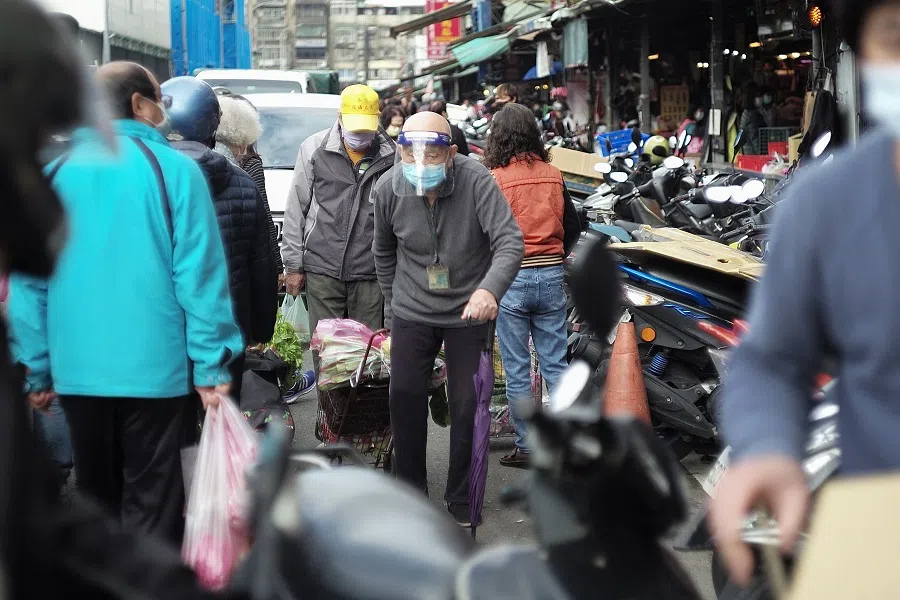
When interviewed by Zaobao, Professor Cheng Li-chen from the Department of Social Work at the National Taiwan University said that the increasing number of poor elderly people falling through gaps in the social safety net is an issue of concern.
According to Professor Cheng, family income and expenditure surveys over the years indicate that 5 to 6% of Taiwan's population live below its poverty line, but administrative restrictions mean that less than 3% of its population qualify for lower- and lower-middle-income government subsidies, which is "a long way off an accurate depiction of our poverty rate".
Building social housing is a challenge that requires funds, planning and time.
Difficult solutions
Touching on the two issues of elderly folks unable to move freely in their old residential units and the homeless elderly, Professor Cheng pointed out that solutions include the provision of more social housing and rental subsidies to first resolve the problem of accommodation.
Professor Cheng was also candid in sharing that for the government to build more social housing units for the destitute elderly, it would first have to spend huge sums to acquire land. Then it has to overcome resistance from residents who do not want such housing projects in their neighbourhoods for fear of devaluing their properties. "In Taiwan, residential units have been commoditised, so it is very difficult to talk about housing justice anymore. At the same time, it is also a challenge to convince taxpayers of why the government should provide housing to the needy," said Professor Cheng.
She also pointed out that the Construction and Planning Agency under the Ministry of Interior was doing its best to increase the supply of social housing. Through lowering taxes and providing subsidies, it plans to convert 20,000 hotel and private or public owned rooms into social housing within two years.
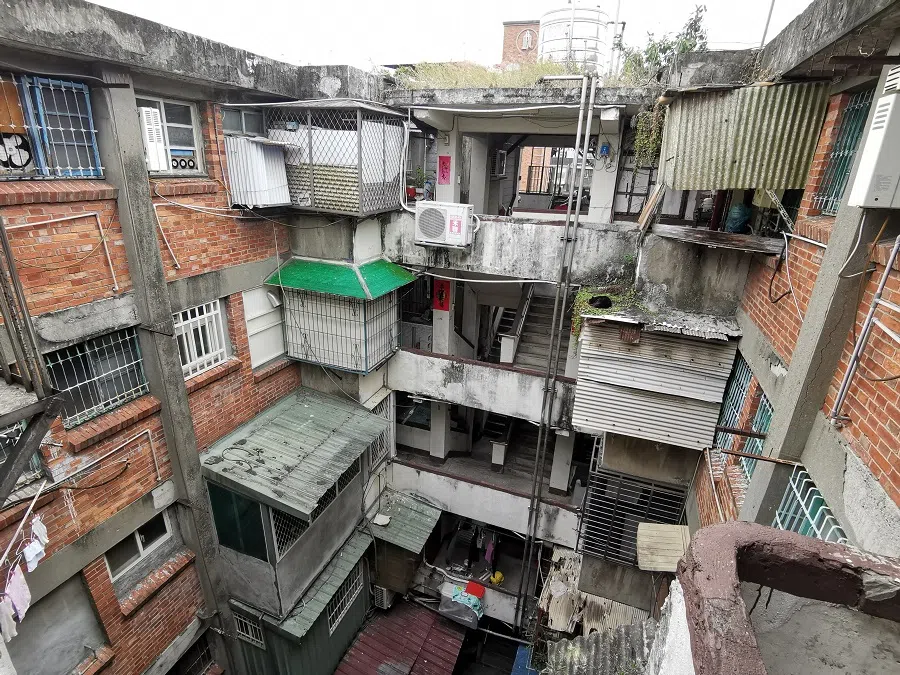
Building social housing is a challenge that requires funds, planning and time. To alleviate the pressing needs of the elderly who are homeless or living alone, Professor Cheng emphasised the relevance of her "housing first" proposal, and urged the government to first provide the old folks with accommodation and soothe their mental pain before helping them find work and stand on their feet.
The government should allocate resources to help the disadvantaged
Professor Cheng has worked closely with social work organisations and the government for many years and was awarded the Social Work Special Contribution Award (社工特殊贡献奖) by President Tsai Ing-wen last year. She pointed out that with the assistance of the Formosa Plastics Group's charity foundations, many social organisations that aid the homeless such as Do You a Favour (人生百味) and Homeless Taiwan (芒草心) have provided the disadvantaged with temporary accommodation for free. "This is the strength of Taiwan's social cohesion, funds are directed where they are needed. If the government is willing to provide rental subsidies, the effect will also be good."
When interviewed by Zaobao, population studies expert James Hsueh Cherng-tay, a retired professor of the National Taiwan University's Department of Sociology, said that the government must demonstrate the role of public influence and allocate resources for long-term plans in order to refurbish ageing buildings and help the destitute elderly who are homeless find accommodation.
...public leadership and political will are crucial for long-term development and targeting the core of the problem to help the disadvantaged. - James Hsueh Cherng-tay, a retired professor of the National Taiwan University's Department of Sociology
Professor Hsueh, who used to be a minister without portfolio in the Ma Ying-jeou administration and was commissioner of the Taipei City Government Department of Social Welfare, criticised the current administration for its fixation with winning elections and "spending exorbitant sums" to win the favour and votes of the public. He said, "As such, it is not easy for the disadvantaged to receive the help they need. In terms of resource allocation, they are definitely not a priority."
Professor Hsueh also commented that public leadership and political will are crucial for long-term development and targeting the core of the problem to help the disadvantaged. "How can a government that is unable to deal with illegal construction, parking, and occupation and usage of state land win the confidence of its people?"
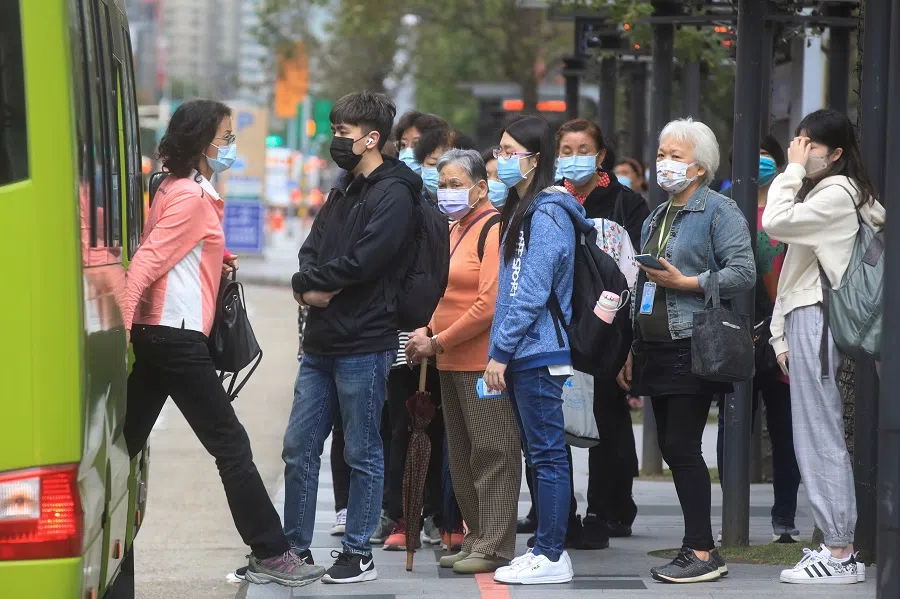
When he was commissioner of the Department of Social Welfare, Professor Hsueh interacted frequently with the homeless, so he is worried about the destitute elderly amongst them becoming spreaders of Covid-19 should they be infected. Thankfully, this group is registered with the Department of Social Welfare which in turn conducts follow-ups to help them.
As for concerns over many destitute elderly failing to qualify for social welfare because of how the poverty line is defined, Professor Hsueh said that the reason is that "ownership of real estate" has been defined too loosely. As such, many of them do not fall below the poverty line because they "own residential property".
He explained that the poverty line has three criteria: monthly income, movable assets and real estate. For example, the monthly income criterion for a low-income household in Taipei City is NT$18,682 (about S$912), which is actually not low. But home ownership in Taiwan is defined using households as the base unit, so everyone who lives together under the same roof is considered a home owner. For example, if the home owner is a direct blood relation such as the parent(s) or child(ren) of an individual living in the same home, the individual is considered a home owner since he or she may inherit the property.
Professor Hsueh pointed out that "regardless of the definition, the home ownership rate in Taiwan is around 85%", so many poor people living in old properties do not qualify for low-income subsidy, resulting in a group of elderly folks who have nothing else other than their homes. That is why he has been advocating for years that the elderly be allowed to reverse mortgage their homes to banks in exchange for cash for their retirement needs.
Setting up elderly care centres and establishing urban tribes
Mutual aid groups that spread love and care are striving to replicate elderly care centres in communities throughout Taiwan; social welfare organisations are also joining hands to light up the streets and establish "urban tribes" for the homeless.
62-year-old Fang Her-sheng is the chairman of the Alliance of Taiwan Foodbanks and borough chief (里长) of the Zhongqin borough in the Zhongzheng district of Taipei City. As a volunteer, he is responsible for four food banks in the city. His organisation delivers meals to sick elderly people and also encourages old people living on their own to go to their centres for communal meals.
At the four care centres, more than 300 disadvantaged elderly are cared for and none of them has contracted Covid-19.
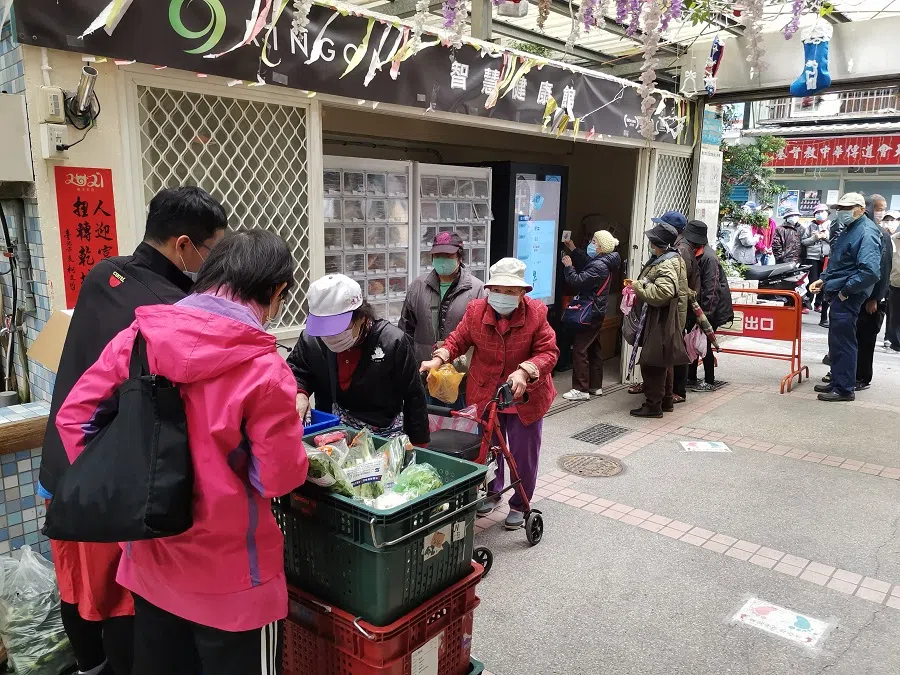
The South Airport Joyous Living Centre (南机场乐活园地) is one such care centre managed by 55-year-old Pan Meixiang. She said the centre prepares 500 omakase packed meals for the old folks in the community daily. The centre also engages professional social workers to plan activities for the elderly, provides counselling services to single-parent families, and provides free tuition services to students. During a visit, I saw a number of young people dropping by to donate freshly-cooked packed meals and fresh vegetables, making for a heart-warming and convivial ambience.
During the interview, Fang said that the elderly folks were well cared for by the social workers and volunteers working hand in hand. "We rent places for those without a place to stay. We feed those who cannot afford meals and give groceries to those who cannot afford to buy", said Fang. At the four care centres, more than 300 disadvantaged elderly are cared for and none of them has contracted Covid-19.
Recently, Fang has been conducting sharing sessions and he hopes to replicate their success throughout Taiwan by setting up many more community care centres for elderly people. Not long ago, with the generous support of donors, Fang and his team gave out some 22,000 care packs containing dried food and daily necessities to the disadvantaged in more than 200 communities.
71-year-old Zheng Xiuzhen is a beneficiary of the efforts put in by Fang and his team. Every afternoon in the past three years, she has showed up at the South Airport centre to collect bread.
When interviewed, Zheng said that she has been living alone after her husband and mother passed away. She does part-time work to pay for her living expenses. She described the old folks being cared for by the centre as being "very fortunate", so she also volunteers to deliver food to other elderly people who have difficulties leaving their homes. In doing so, she feels that she is living a full and meaningful life.
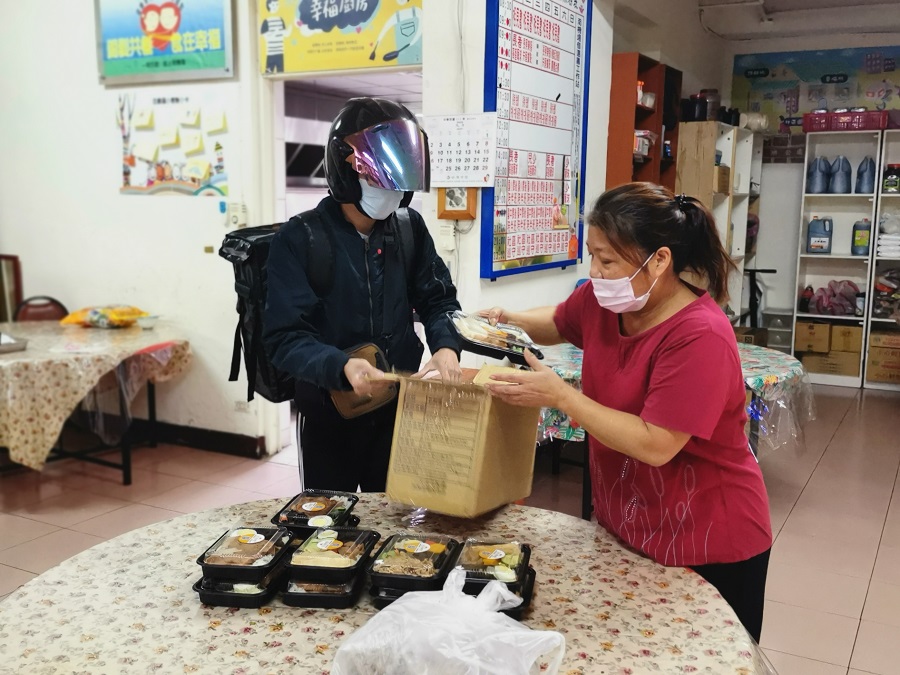
Do You a Favour is a social welfare organisation that aims to brighten the lives of the homeless. 32-year-old Wu Yande is its founder and he hopes to establish an "urban tribe" for the homeless poor to provide them with emotional and financial support.
Three years ago, he and his partners set up the Fixfixjogood (重修旧好) cafe near Taipei Main Station to provide the homeless with a place to shower, wash clothes, sit down to have meals and get to know each other. With the help of donors, the homeless are also provided with temporary accommodation for free, help to find jobs, and advice on how to start saving. When their situations have improved, they leave to rent a place on their own.
...while social welfare organisations provide timely aid, the government also needs to enhance its social welfare structure and social safety net. - Professor Cheng Li-chen of the National Taiwan University's Department of Social Work
Tighten the social safety net even as social welfare organisations chip in
Do You a Favour also joined hands with other like-minded social welfare organisations to de-stigmatise homelessness. Some of their initiatives include bringing participants to visit homeless people and inviting homeless folks to share their life stories in tertiary education institutions so that the public starts treating them as part of the community instead of outsiders. People will then understand that the homeless are not scary, but regular people who have fallen on hard times.
As for the destitute elderly rendered homeless by the pandemic, Wu was honest in sharing that even though social workers have been working hard, some of the elderly homeless would still slip through the cracks. However, once they enter the social welfare network, they would be looked after instead of having to be on their own for the rest of their lives.
Professor Cheng from the Department of Social Work at the National Taiwan University also felt that while social welfare organisations provide timely aid, the government also needs to enhance its social welfare structure and social safety net. For example, it can learn from Singapore's Central Provident Fund system and reform its insurance schemes so that the disadvantaged elderly are given more protection. At the same time, there should also be a greater focus on financial education so that the young start early to prepare for financial security during their retirement years.


![[Big read] When the Arctic opens, what happens to Singapore?](https://cassette.sphdigital.com.sg/image/thinkchina/da65edebca34645c711c55e83e9877109b3c53847ebb1305573974651df1d13a)


![[Video] George Yeo: America’s deep pain — and why China won’t colonise](https://cassette.sphdigital.com.sg/image/thinkchina/15083e45d96c12390bdea6af2daf19fd9fcd875aa44a0f92796f34e3dad561cc)